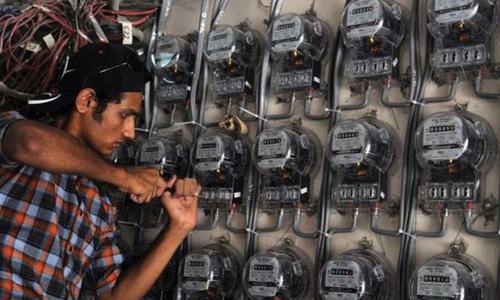ISLAMABAD: Undecided whether to pass on to consumers or absorb the Rs90 billion outstanding cost of electricity consumed by Karachi residents five years ago, the Economic Coordination Committee (ECC) of the cabinet on Wednesday approved charging 57 paise per unit recent quarterly adjustments in July, August and September.
Presided over by Finance Minister Miftah Ismail, the ECC also approved a total of Rs177bn supplementary grants, including the payment of Rs37bn to K-Electric for the tariff differential subsidy (TDS) and Rs96bn to 11 independent power producers (IPPs) set up under the 2002 power policy as the second instalment of the committed payments under the 2021 renegotiated agreements.
“The ECC approved tariff rationalisation for K-Electric by way of adjustments of increase Rs0.571 per unit with a recovery period of three months,” said an official announcement. This increase in tariff is on account of quarterly adjustments for July-September 2021.
In addition, the National Electric Power Regulatory Authority (Nepra) was asked to issue a revised schedule of tariff (SOT) for October-December 2021 or incorporate it in the latest schedule of tariff for the Jan-March quarter after incorporating tariff rationalisation.
It may be noted that Nepra has already determined a reduction of 47 paise per unit for January-March 2022 and an increase of Rs1.33 per unit and Rs6.49 per unit for the two quarters of April-June 2021 and October-December 2021, respectively.
The Ministry of Energy’s Power Division submitted another summary on the notification of quarterly tariff adjustments (QTAs) of K-Electric from July 2016 to March 2020 and the associated financial impact of Rs90bn. The delays were initially caused by stay orders obtained by KE but the final QTA determinations issued by Nepra could be implemented by the PTI government, which asked Nepra to provide it with a solution.
Nepra expressed its inability, saying it had completed its process of tariff determinations and it was now up to the government under the law to impose a tariff surcharge on consumers to recover the amount or take it over as subsidy. The PTI government remained undecided. Meanwhile, Nepra also came up with determinations for three subsequent quarters — April to December 2022 — with an additional impact of Rs24bn, taking the total outstanding amount to Rs113bn.
In a kind of retaliation, KE stopped payments to the national grid with which its power supply contract expired in 2015 but supplies continued. KE’s payables to the national grid went beyond Rs390bn in the meanwhile.
The Power Division suggested that Rs24bn should be recovered from KE consumers through a Rs1.45 per unit surcharge in 12 months as similar amounts from consumers of distribution companies (Discos) had been recovered and the old amount of Rs90bn be absorbed as subsidy by the federal government. For this, the Power Division suggested that about Rs37bn be released as subsidy to KE for the onward release to the Central Power Purchasing Agency (CPPA), which is the federal agent of the national grid company.
The ECC did not take a conclusive decision on the entire spectrum of these adjustments but allowed the utilisation of the available budget of Rs36.95bn as advance subsidy in 2021-22 for onward release to the CPPA due to the paucity of time.
On another summary of the Power Division on the settlement of payables to government-owned power plants on a par with IPPs, the ECC allowed the release of Rs17bn in the current financial year as investment in ex-Wapda Discos for the payment to RLNG-based public power plants (Haveli Bahadur Shah, Bhikki and Balloki) to meet their cash requirements.
The ECC also approved the payment of Rs96bn to 11 IPPs set up under the 2002 power policy whose final settlement of tariff renegotiations had been hampered by the National Accountability Bureau (NAB) investigations.
These IPPs and the government agreed to go for local arbitration under retired Justice Maqbool Baqir. The PTI government had cleared in January this year the first instalment of 40 per cent to these 11 IPPs, including Nishat Chunian of the Mansha Group that’s accused of having received excess profits.
The PTI government had decided that since Nishat was accused of Rs8.36bn excess profits and had agreed to let the government withhold this amount until a decision, it should be paid up to Rs8.77bn. The ECC cleared the payment of a total of Rs96bn, including Rs78bn as the second instalment (60pc) to these 11 IPPs, Rs8.77bn to Nishat and Rs8.7bn to TNB Liberty Power, which had been paid Rs14.5bn last year.
Published in Dawn, June 23rd, 2022













































